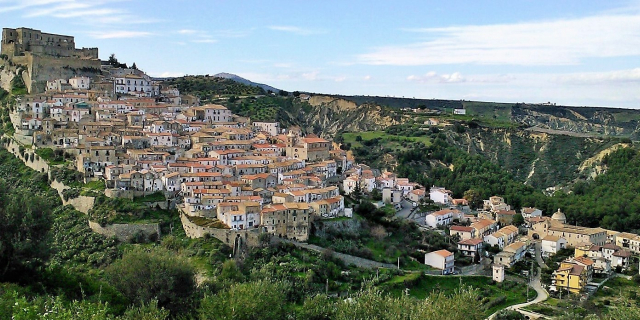Monopoli (Italian: [moˈnɔːpoli]; Monopolitano: Menòpele [məˈnɔːpələ]) is a town and municipality in Italy, in the Metropolitan City of Bari and region of Apulia. The town is roughly 156 square kilometres (60 sq mi) in area and lies on the Adriatic Sea about 40 kilometres (25 miles) southeast of Bari. It has a population of 49,246 (2014) and is important mostly as an agricultural, industrial and tourist centre.
 Map of the fortifications of Monopoli in the 16th century
Map of the fortifications of Monopoli in the 16th centuryThe area was first settled in about 500 BC as a fortified Messapian city.
In order to improve communication with the East, between the years 108 and 110 AD, the Emperor Trajan ordered the construction of a Via Publica which was named after him. Monopoli is the city in Apulia that has the longest stretch of the Via Traiana. This is one of the most important Roman roads of the Empire. In 2012 the city of Monopoli created an archeological park around the remains of this ancient road. The difference between this new road and the Appian Way was the shorter distance between Benevento and Brindisi. The Appian Way started in Rome, reaching Benevento and continuing on to Taranto, and from there the road continued to Brindisi, from which port people could take ship for Greece, the Orient and the Balkans. The Via Traiana, which followed an older route, began in Benevento and crossing the flat tableland up to Canosa continued on to Ruvo, where a fork in the road led in two different directions. The inland road went to Modugno, Ceglie del Campo, Capurso, Rutigliano and Conversano, while the coastal road went to Bari, Polignano, and Monopoli. These two roads joined again at Egnazia, from where the road continued to Brindisi. This road which Emperor Trajan had constructed became the route of choice to reach Brindisi because it was shorter than the Appian Way. It was travelled by military troops, merchants, slaves, pilgrims and, after the fall of Rome, even by hordes of barbarians. There is another important road on the other side of the Adriatic Sea which seems to be the continuation of this road. It is called the Via Egnatia (Egnazia Way) and starts in Dyrrachium (Durazzo), in Albania, crossing a mountainous area to reach Thessaloniki (Salonica) and continuing on to Constantinople (Istanbul).
After the destruction of Gnatia by the Ostrogoth king Totila in 545, its inhabitants fled to Monopoli, from whence it derives its name as "only city". In the following centuries the area would be controlled by the Byzantines, Normans and Hohenstaufen. At the height of its splendour, the city was a point of departure for naval expeditions during the Crusades. Later it was a fief under Angevine and Aragonese feudal lords.
In 1484 the city came under Venetian control and saw an economic upswing as a seaport on the Adriatic Sea, a base between Bari and Brindisi as well as through trading its own agricultural goods. It was frequently attacked by Muslim pirates in the following decades. These continuous threats forced Monopoli to build strong fortifications which allowed them in 1529 to resist the Armada of Charles V for three months, forcing the Spaniards to abandon the siege. In 1529 the city, protected by its highly effective defensive system, with the help of Venetian soldiers and its citizens, successfully resisted a three-month siege by the Spanish imperials under the command of the Marquis of Vasto Alfonso III d 'Avalos, which is forced to withdraw due to losses. After the peace with Venice, the city passes peacefully into the hands of the Spanish imperials of Charles V of Habsburg. However, though Monopoli pass back under Spanish rule, it still was granted a free city status.
It became part of the newly unified state Kingdom of Italy in 1860.
The city, lying in the south of Italy or Mezzogiorno, enjoyed a certain economic development during the 1960s thanks to the opening of a Tognana (an important Italian ceramic manufacturer) industrial plant. The closure of the plant at the end of the 1990s was a major blow to the city's economy. Monopoli's economic recovery in the last year has been due mainly to new industries, the most important being MerMec, a manufacturer of railway material, along with the development of tourism, especially in the countryside and on the coast.


























Add new comment